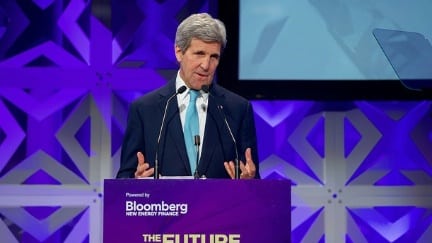
The world must transition away from fossil fuels for energy generation, and fast, Secretary of State John Kerry said Tuesday in New York. “If we’re going to stave off the worst impacts of climate change we have to accelerate this transition. We need to get to the point where clean energy sources are generating most of the world’s energy and we need to get there quickly, certainly by the middle of this century,” Kerry said at Bloomberg New Energy Finance’s Future of Energy Summit.
Kerry lamented the length of time it has taken for climate science to take hold, saying “it took us decades to understand that what can seem like the cheapest sources of energy in the short term actually has insurmountable costs in the long term.”
However, Kerry said, just because climate action has been delayed does not mean it’s not worthwhile. “None of this is preordained. We’re not locked into this disastrous future we still have time to improve the way that we power our world and in doing so we still have time to avoid the worst impacts of climate change,” the secretary said.
At the center of Kerry’s message is the idea that not only is a transition to clean energy necessary to avoid the effects of climate change, but such a transition is a good move economically. The Paris Agreement adopted in December, the world’s first universal climate deal, is a clear indicator that the global market is shifting.
“Every country in Paris acted with the conviction … that if we make the changes necessary to combat climate change, we will also unlock a global marketplace for clean energy the size of which the world has never seen before,” Kerry said, later stating that “clean energy is one of the greatest economic opportunities the world has ever seen.”
The renewable energy industry in the U.S. has been improving. The U.S. Energy Information Administration projects that total renewables used in the electric power sector will increase by 8.7 percent in 2016 and by 6.5 percent in 2017. Solar power alone is projected to increase 40 percent by year’s end. Renewables currently account for roughly 13 percent of the nation’s energy generation.
Kerry did take a few jabs at climate change deniers in government. “You’d think that people in positions of public responsibility would get it after 30 years. Maybe they do, but politics, sheer politics, keeps them from admitting it, which is in and of itself a new kind of irresponsibility,” he said.
Regardless of the naysayers, Kerry went on, a clean energy transition is going to happen. “The direction in which the global economy is moving is not up for debate, no debate. The world is already moving straight towards the low-carbon future that we need, and the question is simply, will we get there fast enough?”